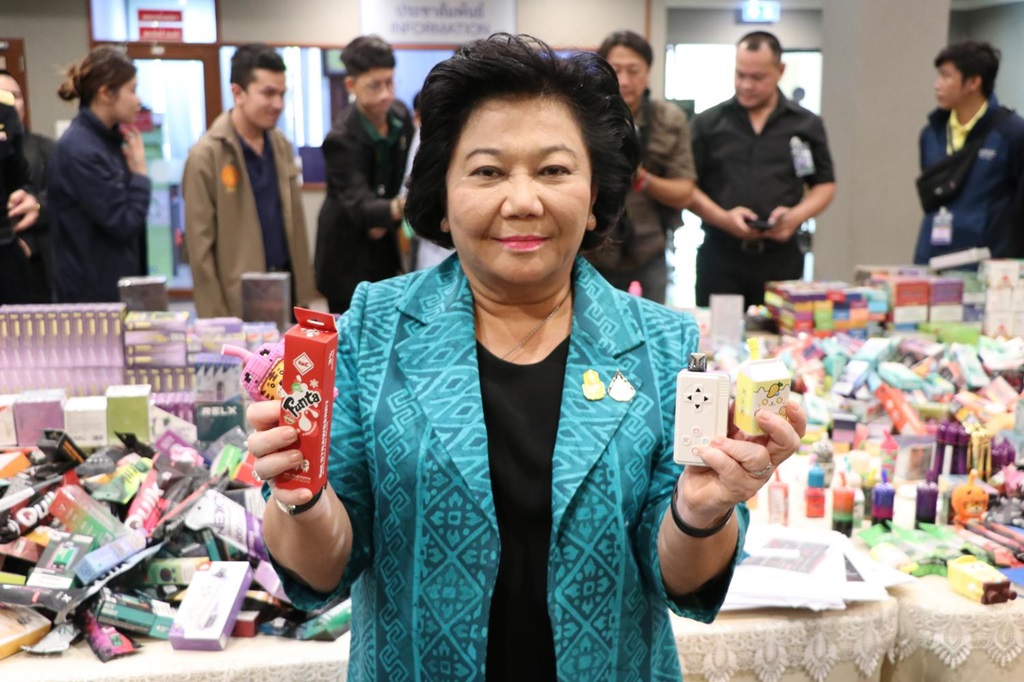Thailand’s Consumer Protection Police Division (CPPD) is requesting a coordinated effort to safeguard adolescents from the detrimental effects that toy pods, vapers and e-cigarettes pose to children’s health.
Thailand’s Consumer Protection Police stated that in order to educate young people about the health dangers associated with vaping, educators, school personnel, parents of young cVendors hildren, and their relatives must collaborate.
It is probable that they will face criminal prosecution in Thailand for violating the laws that prohibit the sale and possession of such devices, according to CPPD chief Pol Maj Gen Wittaya Sriprasert.
He stated that the number of cases involving illicit possession and/or sale of e-cigarettes and/or their cartridges has increased in recent years, citing CPPD data.
Authorities seized toy pods and e-cigarettes from 31 vendors in 2022 for a total value of two million baht. A year ago, they seized electronic cigarettes and cartridges valued at 10.14 million baht from 25 vendors.
He stated that CPPD officials have seized toy pods, e-cigarettes and vape cartridges worth 2.7 million baht in 42 cases as of this month.
Saturday marked the most recent apprehension of two suspected of selling toy pods and e-cigarettes along Sukhumvit Road in the Watthana district of Bangkok.The suspects were apprehended with an extensive quantity of electronic cigarettes and vapers, Pol Maj Gen Wittaya stated.
Despite being illegal under Thai law, the CPPD chief stated that the police have conducted an investigation into why and how e-cigarettes have gained such popularity among Thai youths in such a brief period of time.
He told Thai media that a recent study revealed that the elegant designs, extensive flavor selection, and variety offered by the devices were what initially attracted the majority of youth consumers.
He added that toy pod, e-cigarette manufacturers and retailers employing online marketing and other advertising strategies to target young people are additional factors contributing to the surge in popularity of vapes.
Additionally, the study revealed that numerous individuals perceived e-cigarettes as a cost-effective alternative to traditional cigarettes due to their reusability and lower price point, he explained. He further stated that among Thai adolescents, awareness regarding the true health consequences of e-cigarette use is relatively limited.
Doraemon Toy Pods 9000 Puffs

Toy pods resemble adorable figurines so closely that they are nearly unrecognizable as electronic cigarettes. They may appear innocuously endearing, featuring an assortment of enticing flavors and vibrant hues reminiscent of cartoons.
E-cigarettes have gained widespread usage in Thailand, notwithstanding the fact that they pose a legal ban and elevate the risk of developing respiratory disease.
To appear harmless to vulnerable targets, particularly adolescents, the playful designs of the nicotine vaping devices, nicknamed “toy pods,” appear to convey the devices’ status as smoke-free, fashionable, and socially acceptable alternatives.
Particularly the additives and nicotine, the World Health Organization (WHO) has confirmed that the compounds in electronic cigarettes are hazardous and toxic. Highly addictive is nicotine, the primary component of both tobacco cigarettes and electronic cigarettes.
Nicotine use during childhood and adolescence has significant implications for cognitive development and may contribute to the development of anxiety and learning disorders. However, the e-cigarette industry specifically targets the youth demographic.
The secretary-general of the Thailand Youth Institute, Patcharapan Prajuablap, stated that a recent assault on e-cigarette shops in the Ratchadaphisek neighborhood of the Din Daeng district provided conclusive proof that the e-cigarette industry generates substantial revenue.
According to an investigation by the institute, a 20-square-meter store could generate up to one million baht per month, with 70% of its customers being minors.
4th Graders Using Toy Pods

The study also revealed that the busiest sales hours are from 2:00 to 6:00 pm, when students have left for the day. Toy pods, which feature an attractive and vibrant design, are the most popular products during this period. A single toy capsule contains 5,000 puffs.
Mr. Patcharapan asserts that Bangkok is home to over a thousand e-cigarette establishments, the majority of which are situated in close proximity to educational institutions; the closest is merely 130 meters from a neighborhood school.
Additionally, Bangkok has the greatest rate of teen e-cigarette use, according to the study (32.3%). As opposed to submitting orders online, these children reportedly purchased the toy pods from the stores.
“We have found that e-cigarette vendors have been trying to target young customers by offering options of flavours they like, such as Nong Pho [a Thai milk brand], Milo and Ovaltine,” he reported.
“Worse, the manufacturers and sellers even use toy marketing in advertising the e-device to create the image that the product is not dangerous to children.”
According to Mr. Patcharapan, every electronic cigarette product sold in Thailand is produced in neighboring nations.
Therefore, enhancing the efficacy of customs inspections conducted on international cargo represents the most effective approach to avert the issue.
Thailand has prohibited the import of electronic cigarettes since 2014, according to Prime Minister and Finance Minister Srettha Thavisin, who stated this recently.
“The Prime Minister should direct the Department of Customs to implement measures to prevent the smuggling of electronic cigarettes in. “It is improbable that the ongoing cat-and-mouse will resolve the issue,” he further stated.
Vaping made them feel cool

A year ago, in collaboration with the Department of Health Service Support of the Ministry of Public Health, the institute surveyed Thai adolescents regarding the use of electronic cigarettes. 25% of the 61,688 participants, who had an average age of 15, reported using vaping devices.
Moreover, compared to the group that did not reside in a smoking environment, young people who shared an environment with e-cigarette consumers were 1.3 times more likely to develop the habit.
Children who were unaware of the risks associated with e-cigarettes were 1.14 times more likely to begin using them.
A lecturer in the Faculty of Medicine at Ramathibodi Hospital, Dr. Roengrudi Pathavanich, stated that her team conducted a study at two primary schools in Lop Buri and Tak at the beginning of this year and were astounded by their findings.
She reported that more than half of the 43% students aged 10 and older (grades 4 to 6) who had experimented with electronic cigarettes were female. 22% of students in Tak who are the same age have utilized electronic cigarettes.
According to reports, the students stated that using e-cigarettes made them feel cool and that they did not consider them to be hazardous.
A quarter (20%) of these students indicated that social media served as an inspiration, whereas 23% said they acquired their e-cigarette from a family member.
Additionally, Dr. Roengrudi stated that her prior research revealed that the mean age at which children began smoking cigarettes was eighteen years, with less than five percent beginning the habit in elementary school.
Children who use e-cigarettes are five times more likely to switch to traditional cigarettes, according to the study. This suggests that e-cigarettes serve as an entryway to combustible cigarettes.
“The number is absolutely terrifying; child protection is required immediately.” “Strict enforcement of the ban on e-cigarette sales in the country by the government is imperative,” she stated. “Otherwise, it will send the wrong message to children that the product is safe and good for use.”






